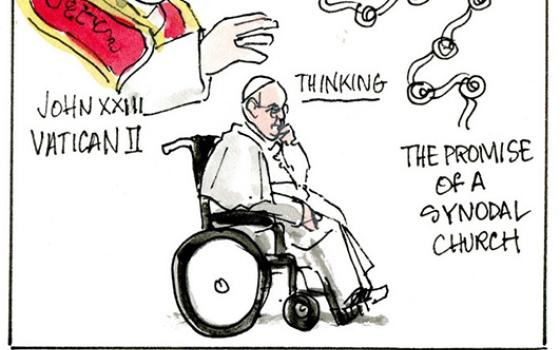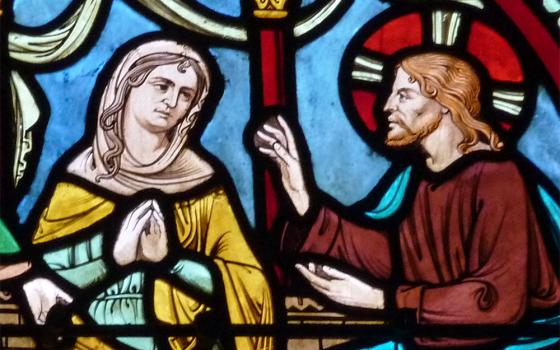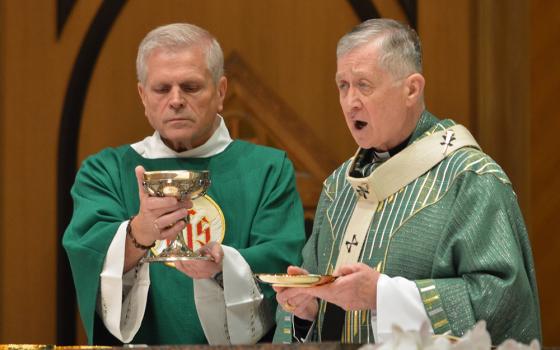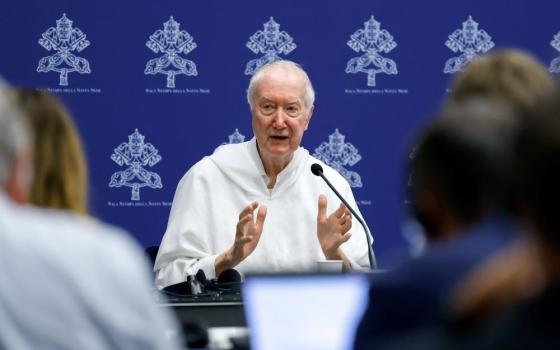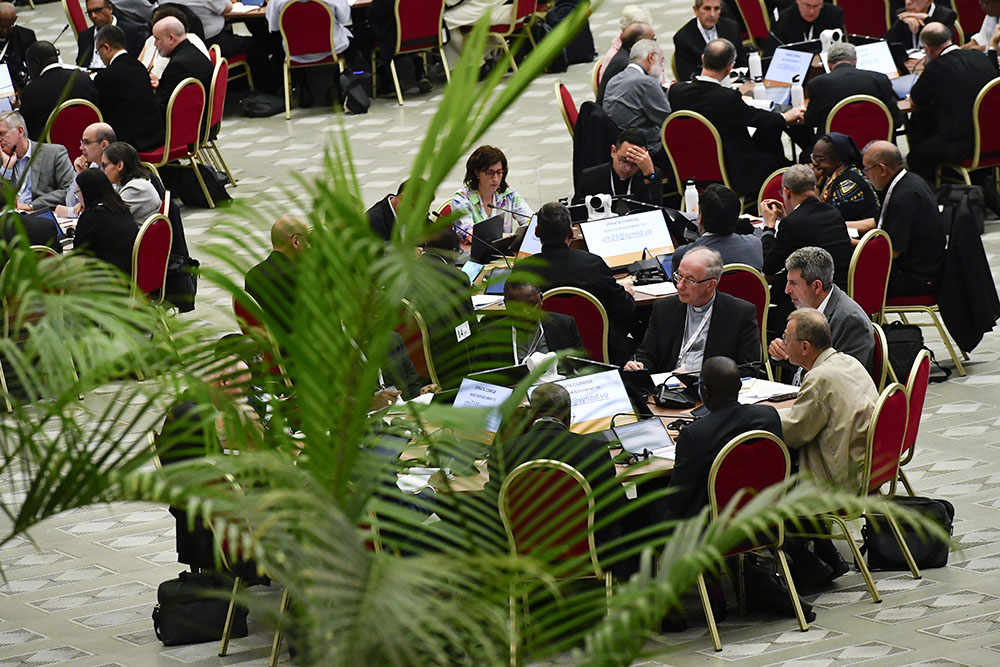
Members of the assembly of the Synod of Bishops, organized into 35 groups based on language, begin their small-group discussions Oct. 5 in the Paul VI Audience Hall at the Vatican. (CNS/Vatican Media)
Last week, when the Holy Father opened the synod, one passage was addressed specifically to journalists. This is one of the rare instances when I think I disagree with the pope.
The pope said:
We have to provide a communication that reflects this life in the Holy Spirit. This requires an asceticism — pardon me for speaking this way to the journalists — a certain fasting from public speech in order to ensure this. Let whatever is published be in this vein. Some will say — and are saying — that the bishops are afraid and that is why they don't want the journalists talking. No. The work of journalists is very important. But we have to help them so that they can also speak of this journeying in the Spirit. More than speaking, the priority is that of listening. I ask journalists to please make this known to people, that they realize that the priority is to listen.
Dear Pope Francis: It is not our job as journalists to make known just what you want to be made known. While it is true that some in the media are trying their best to make the synod fail, most of us in the media understand our job differently. We are reporting on the synod, not trying to help it fail — or to succeed. That's your job, Holy Father.
The pope then said something that seemed to guarantee that his goal for journalistic coverage would be frustrated. He said:
During the synod on the family, public opinion, the fruit of our worldliness, [thought] that communion was going to be given to the divorced, and in that spirit we began the synod. When we had the synod for the Amazon, public opinion, pressure, [thought] that viri probati were going to be [ordained], and we went in under that pressure. Now there is speculation about this synod: "What are they going to do?", "Maybe ordain women" ... I don't know, those are things they are saying out there. And it is often said that the bishops are afraid to talk about what is going on.
If you want to guarantee that we in the media don't report on "things they are saying out there," don't tell those inside that they should be "fasting" from giving interviews to the media! If we can't find out what is going on inside the synod hall, we will only be able to report on what is going on outside.
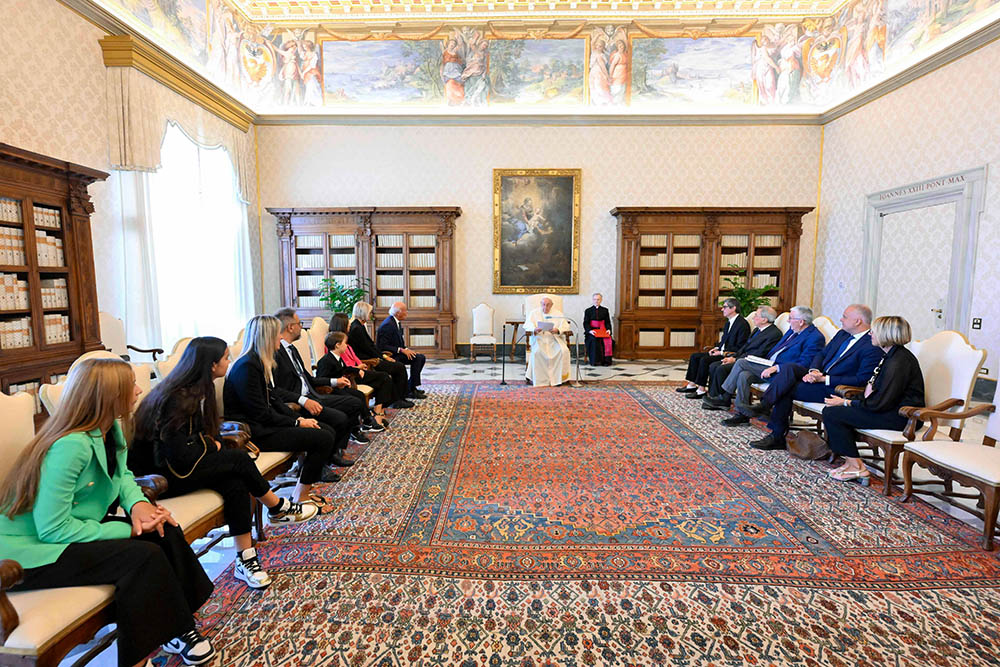
Pope Francis meets a delegation from the Italian "E' Giornalismo" prize during an audience in the library of the Apostolic Palace at the Vatican Aug. 26. The pope asked Italian journalists to help him communicate effectively about the upcoming Synod of Bishops. (CNS/Vatican Media)
N.B. My colleagues Christopher White, Joshua McElwee and Rhina Guidos will find out what is going on inside the synod hall no matter how much fasting there is!
Listening to what the pope said about "public opinion, pressure" in advance of the Amazon synod, the organizers of events like the "Spirit Unbounded" conference must be wondering if their efforts will prove counterproductive. The first group listed on its website is the United Kingdom's "Root and Branch Synod." As the name suggests, that group claims a revolutionary approach to ecclesiology that, strangely, envisions a decidedly urbane, upper-middle-class, highly educated and left-of-center church.
Whatever you think of its agenda, this parallel conference seems precisely the kind of "public opinion, pressure" about which the pope warned.
Certainly, those opposed to the synod have been mounting their own efforts to exert pressure on the synod. At the EWTN-owned National Catholic Register, an article seemed to conflate the actual synod with "Spirit Unbounded." The headline references "veiled agendas" but there is nothing veiled about this alternate conference.
The insinuation is that its radical agenda might impact the deliberations inside the synod hall. I am not a psychologist, but I believe the technical term for that insinuation is projection.
Advertisement
Another example of putting pressure on synod deliberations was revealed in the Wall Street Journal op-ed page where Francis X. Maier disclosed his role in the drafting of a letter from 13 conservative cardinals to Francis during the 2015 synod on the family. Maier, who is now a senior fellow at the Ethics and Public Policy Center but was previously the longtime amanuensis to former Philadelphia Archbishop Charles Chaput, wrote:
The problem with synods under Pope Francis is the ugly appetite for intrigue among many of his supporters. I write from experience. I worked for a bishop-delegate to three synods: 1997, 2015 and 2018. At the last two — the Synod on the Family and the Synod on Youth, respectively — I also helped other Anglophone delegates. In 2015, 13 cardinals wrote a private letter to the pontiff with their concerns about the direction of the gathering. They were exercising their office as counselors to the pope, and the letter was respectful and appropriate. It was also confidential and meant to remain so. I know because I staffed its drafting, reviewed the final text, and helped collect signatures. Once delivered, it was promptly leaked to the media in a way designed to humiliate and neutralize the signers, including the late Cardinal George Pell.
In Maier's telling, the cardinals' effort almost sounds heroic but, in fact, they were exercising the old Roman ploy of running to Daddy. If they had stood in the aula and spoken their minds, they knew there would be pushback. And, not incidentally, the common denominator of those "Anglophone" delegates he "helped" was not only their language but their hostility to the pope.
These are the headwinds the synod delegates must face. Whether or not they give interviews to the press about what has happened, they need to be willing to tune out the noise outside the hall and listen to each other.
The synod preparatory documents bring the voices of the universal church into the room, they do not need the Francis Maiers or Root and Branch synodalists to usurp the process of consultation that has gone on the past two years. And, it turns out, in our tradition, there are some resources for attending to the voice of the Spirit, and that is where I will pick up this look at the early stages of the synod on Friday.





